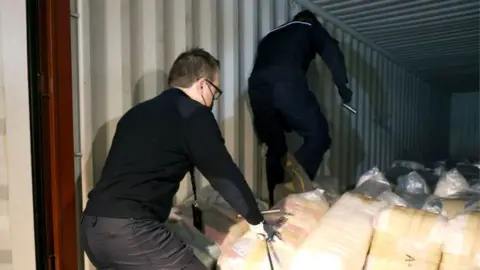Antwerp drugs: Record seizures at Europe's 'cocaine capital' port
Authorities in Belgium say they seized a record amount of cocaine at the port of Antwerp last year.
The port city has become Europe's main gateway for the drug shipped from South America.
Belgian Finance Minister Vincent Van Peteghem said 116 tonnes of cocaine were seized in Antwerp, a 5% increase on 2022.
It is thought only a small fraction of the drug, possibly a tenth, is actually detected on arrival at the port.
Customs officials have previously told the BBC they will never win the war against the powerful cartels.
The increase in the illegal trade has sparked spiralling violence in Belgium between gangs vying for control of a highly lucrative market for cocaine.
"These are quantities that pose a gigantic danger to safety in our ports and cities, to the safety of the many hundreds of customs and dock workers on site and to the safety of our families," Mr Van Peteghem told reporters.
Driving around the sprawling port in Antwerp you immediately see why the cocaine gangs have invested their efforts in making it their import capital, and you appreciate the massive challenge the authorities face.
There is now 160km (100 miles) of quayside where millions of tonnes of goods are unloaded from their ships to be sent to all corners of the continent.
 FRANCOIS WALSCHAERTS/AFP
FRANCOIS WALSCHAERTS/AFPIt's a rapid conveyor belt of often highly perishable goods that provides great opportunity for the cocaine kings. Stashing drugs inside fresh fruit crates, particularly containers of bananas, remains a favoured tactic.
During a BBC investigation last year into how Antwerp had become Europe's biggest entry point for the drugs, custom officials revealed that gangs fully anticipated that a proportion of their deliveries would be discovered and priced it into their operations.
Still, the profits are huge.
Belgian authorities say 2022 was the first time they intercepted more than 100 tonnes of drugs at the port in a single year.
Belgium's northern neighbour, the Netherlands, has also seen a big increase in cocaine seizures, 59.1 tonnes in 2023, consolidating its position as a distribution hub for many parts of Europe, including the UK.
Ecuador was the biggest source for cocaine seized in the Netherlands, at almost 27 tonnes.
Panama and Colombia are other key points of origin, to mainly Belgium, the Netherlands and Spain.
Law enforcement agencies across Europe say they are working together to tackle the criminal gangs. They cite recent successes, including when they cracked an encrypted platform called EncroChat used to power trafficking networks.
On Tuesday night, 22 people were arrested in an anti-drugs operation in Belgium, including three police officers.
Dozens of searches were carried out in the capital Brussels as well as Antwerp - with cash, expensive cars and a weapon confiscated, according to federal police.
Antwerp has seen an explosion of violence over the last couple of years, with gang-on-gang violence on the city's streets.
Many of the attacks have targeted wrong addresses and in January 2023 an 11-year-old girl was shot dead in an underworld attack.
In recent months, drug-related violence has spread south of the port into Brussels.
Rival gangs often fire at the homes of rivals, not always to kill but in the hope that the hail of bullets will alert authorities to drug-dealing being coordinated inside the property.
The violence and disruption posed by organised crime is on the same level as that of terrorism, according to senior European officials.
Belgian ex-justice minister Vincent Van Quickenborne had to use a safe house after police uncovered an alleged plot by Dutch criminals to kidnap him.
Dutch acting Prime Minister Mark Rutte was placed under even tighter security over fears a cocaine gang may try to target him.
Belgium is currently holding a so-called mega-trial with more than 120 defendants in the dock charged with various drug offences.
